The winners of the 2025 Victorian Early Years Awards were announced on Thursday 6 November 2025, presented by the Parliamentary Secretary for Children, Nathan Lambert MP, at an awards ceremony hosted by radio broadcaster and author Jacinta Parsons.
Winners of each category receive a grant of $15,000 for professional development or to support their initiative.
Awarded for an initiative that promotes access, ongoing participation and engagement in early learning, particularly for families experiencing vulnerability or disadvantage.
Winner: Victorian Aboriginal Community Services Association Ltd
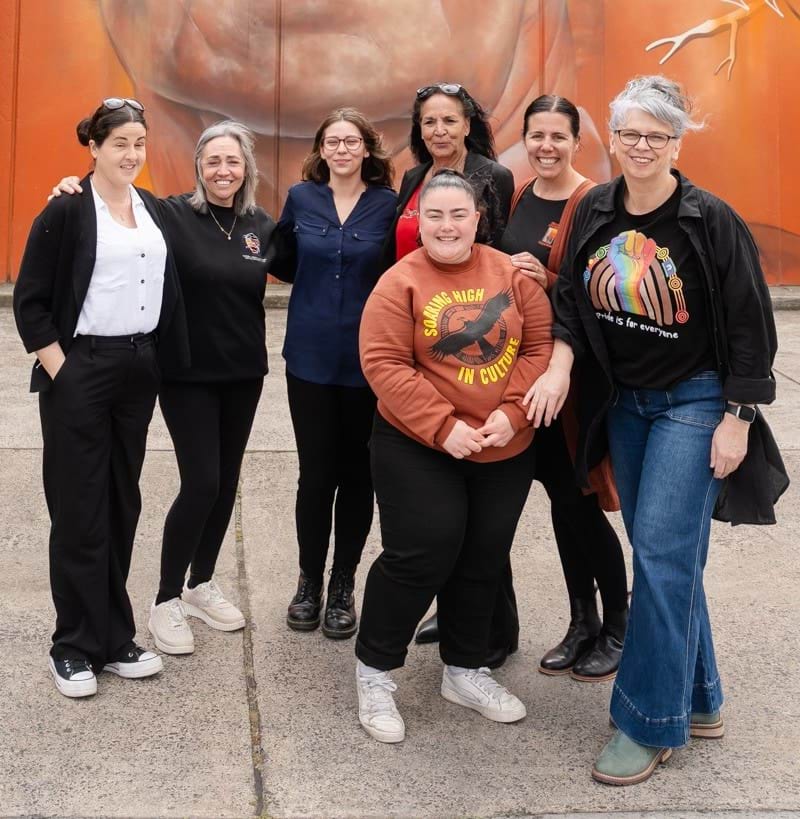
The Victorian Aboriginal Community Services Association Ltd (VACSAL) provides leadership and support to six Aboriginal Best Start sites in partnership with other Aboriginal Community Controlled Organisations. Local Best Start partnerships develop tailored strategies to support participation and engagement in key early childhood services. Aboriginal Best Start has a particular focus on empowering Aboriginal communities and supporting self-determination.
VACSAL has played an important role in the Best Start program since it began in 2002. They provide expertise and guidance on what works to help more Aboriginal children engage in kindergarten, Supported Playgroups, and Maternal Child Health services and help ensure these services make Aboriginal families feel welcomed and safe.
VACSAL works with other stakeholders and providers to help keep Aboriginal culture strong in early childhood education services. Their work is helping children participate in early learning, supporting families to connect with services, and fostering strong cultural identity amongst Aboriginal children.
Finalists
Toy Well Program – Toy Libraries Australia
In partnership with Trawalla Foundation, Besen Family Foundation, Community Hubs Australia, 54 Reasons and Our Place, Hume City Council, host schools and the Department of Education
The Toy Well Program offers free toy libraries for preschool children from migrant and refugee families. Families can access the libraries easily as they are based in a community hub within primary schools.
There are 18 Toy Well libraries across Melbourne and Geelong. More than 650 families use them to support fun and play-based learning at home.
Play is an important part of children’s growth. It helps build their social, physical and problem-solving skills and helps them be ready for school.
Toy Well helps families from non-English speaking backgrounds to support early learning at home. Local parents volunteer to run the libraries, creating safe and welcoming spaces for families from many cultures.
The program also supports parents by encouraging family involvement in play and offering opportunities to volunteer.
Wingate Avenue Community Centre Occasional Childcare
Wingate Avenue Community Centre is in the Ascot Vale public housing estate. It helps families who face challenges, including many with migrant or refugee backgrounds.
The centre is a trusted hub for community services. The hub offers an Occasional Childcare program. The program makes it easier for young children to take part in early learning, provides early years support and promotes children’s learning.
It has a diverse team of educators, many who have lived in public housing. They understand the problems families face when trying to use early learning and school programs.
The Wingate Avenue Early Learning Project started in 2024. It helps families understand childcare, kindergarten and school. It also supports children to move smoothly between programs and helps parents get more involved in their child’s learning.
The team also help families connect to other supports, such as food relief, language classes and job programs.
Awarded for an initiative that supports families, parents and carers to feel confident and capable in their parenting role, and recognises their role as the first and most important teachers in supporting their child’s learning and development.
Winner: Hume Community Hub Playgroups – Hume City Council
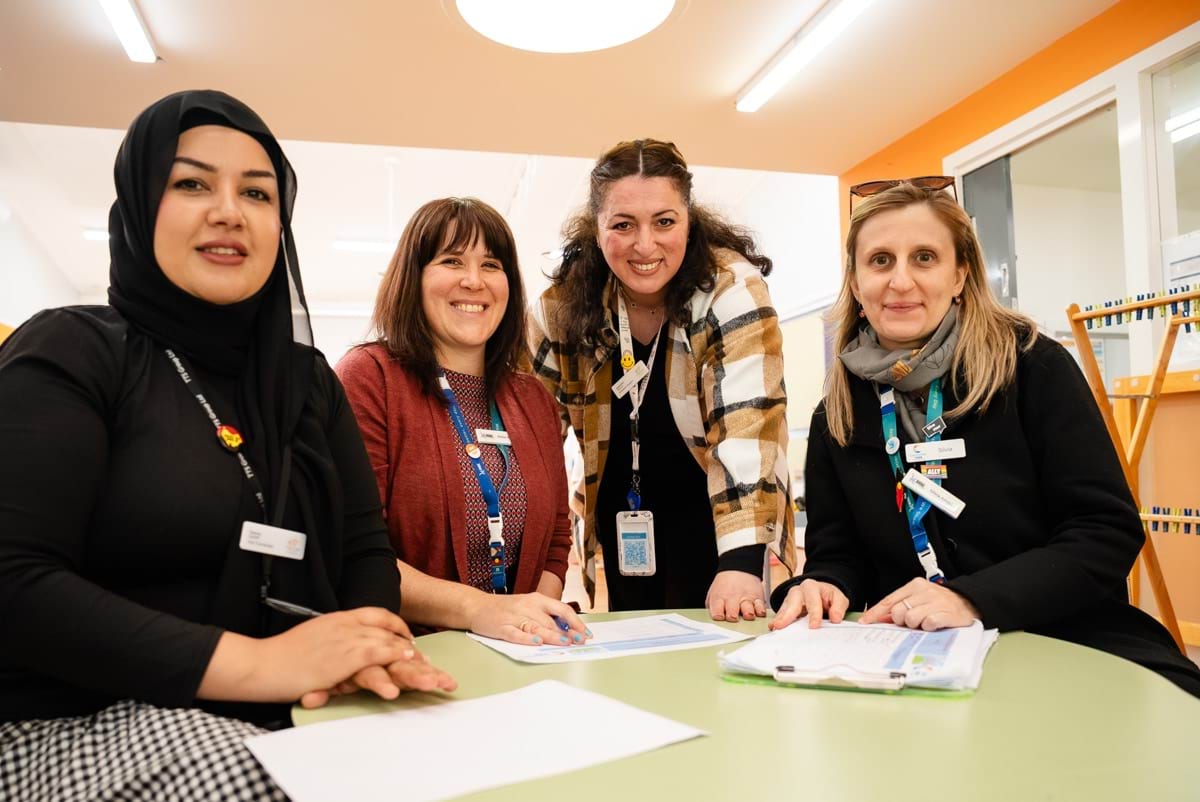
In partnership with with Communities for Children
Hume City Council created Hume Community Hubs Playgroups to support families from refugee backgrounds who were not using early childhood services. The playgroups run in 15 Hume Community Hubs. Hume Community Hubs are based in primary schools and help families with their children’s learning and development. The playgroups provide welcoming, culturally safe spaces for families to connect, learn, and access services.
The playgroups use play to identify needs early and link families to support. Community members, including former participants, facilitate sessions with a Playgroup Officer helping build their skills. In 2024, the hubs ran over 1,800 playgroup sessions, helped more than 29,000 adults and children, and made over 1,700 referrals.
Each playgroup is tailored to local needs. They help families understand local services available such as the Maternal Child Health program, kindergartens, family services and health services.
Evaluation of the program shows the program is improving parents’ confidence and helping children succeed in early learning.
Finalists
Supporting Expecting and Parenting Teens Program – Brave Foundation
Brave Foundation runs the Supporting Expecting and Parenting Teens program for young parents aged 25 years and under who had their first child as teenagers. The program is an evidence-based mentor program. It was created and is led by people who have experienced young parenthood. It gives practical support to help young parents build lives that are healthy and connected.
Mentors work in three locations across Victoria. They use a trauma-informed and strengths-based approach to help young parents achieve their goals in parenting, education, health, housing, money and community life.
An evaluation by the University of Tasmania shows the program helps parents and families. It helps parents become more confident, use health services, engage in early learning, and develop life skills, which benefits children.
Family Haven – Greater Shepparton Lighthouse Project
Family Haven is a local program in Mooroopna that supports families with children under 5 years old. It provides early help to improve children’s learning and family wellbeing.
The program is open to all families without needing a referral. It offers a safe and welcoming space for those facing housing issues, isolation or other challenges. Families can connect with health, education and community services through peer support and practical help.
Parents gain confidence and children benefit from play-based learning, early development checks, and being school ready.
In 2024, Family Haven provided 14,000 hours of support, helped 492 families and made 208 referrals to the National Disability Insurance Scheme. The program offers trusted support that benefits children and parents, and builds a stronger local community.
Awarded for an initiative that promotes collaborative practice to support and demonstrate positive outcomes for children and families.
Winner: Supporting families through collaborative early intervention – Gowrie Victoria Broadmeadows Valley
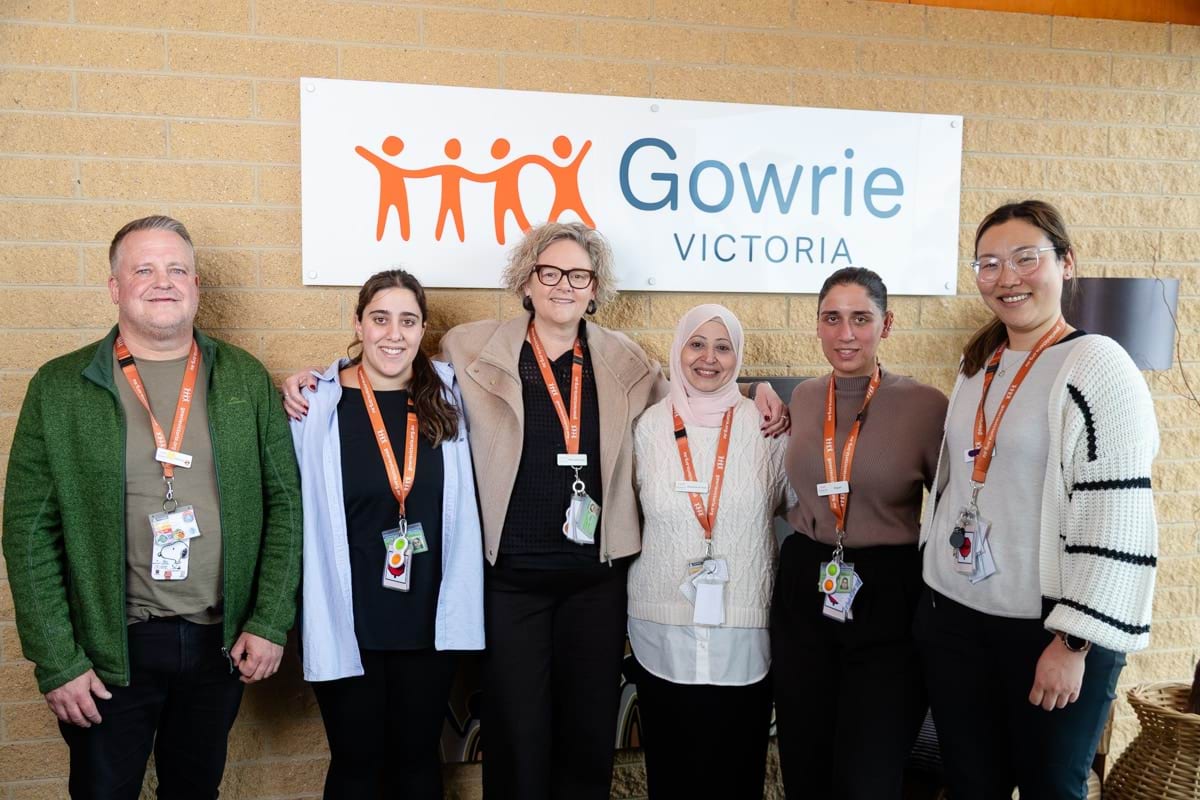
In partnership with MacKillop Family Services
MacKillop Family Services and Gowrie Victoria Broadmeadows Valley formed a partnership in 2022 to support children and families, many with complex needs and from diverse backgrounds.
MacKillop practitioners are social workers and are based at the early learning service. They work with educators to give families early support and connect them to the help they needed.
Educators are trained by MacKillop and use their trusted relationships with families to find those who may need extra support.
Families set wellbeing goals such as finding work or building social connections. They then work with a MacKillop practitioner for up to 20 hours of one-on-one support to reach these goals.
Since the program started, more than 94 families have received help. It has improved kindergarten attendance, increased engagement in early learning and strengthened educator skills in trauma-informed care.
Finalists
Fraser Rise Kindergarten
In partnership with Melton City Council and Springside West Secondary College
Fraser Rise Kindergarten is located in a busy community centre, and had safety concerns because of the behaviour of older students from a nearby school.
To fix this, the kindergarten worked together with Springside West Secondary College and Melton City Council to create a mentoring program. As part of their school learning, the older students visit the kindergarten to do activities with the children to help build meaningful relationships.
Melton City Council’s youth services support the program by providing a place for students to gather after school. There is also a shared code of conduct that helps everyone behave respectfully in the community centre. This program has improved safety, learning and inclusion through teamwork.
From Little Things Big Things Grow – Wyndham Park Kindergarten
In partnership with Wyndham Park Community Centre
Wyndham Park Kindergarten runs a food program that brings families, children and staff together. Families help grow vegetables in the kindergarten garden, cook meals and share recipes and traditions. These activities give children hands-on learning experiences and help families feel connected and supported.
Through these strong relationships, the kindergarten links families to extra help when they need it. Partners include Wyndham Park Community Centre, Foodbank, Co-Health, social workers and other local services.
A social worker, funded through the School Readiness program, helps staff use a trauma-informed approach. This means they work with care and understanding for families.
The food program reflects the kindergarten’s values of kindness, fairness and community care. It supports children to learn in practical ways and helps improve families’ health, wellbeing and a sense of belonging.
Awarded to an initiative that is improving health and wellbeing outcomes for young children.
Winner: From ‘Working Towards’ to ‘Exceeding’ – Connie Benn Early Learning Centre
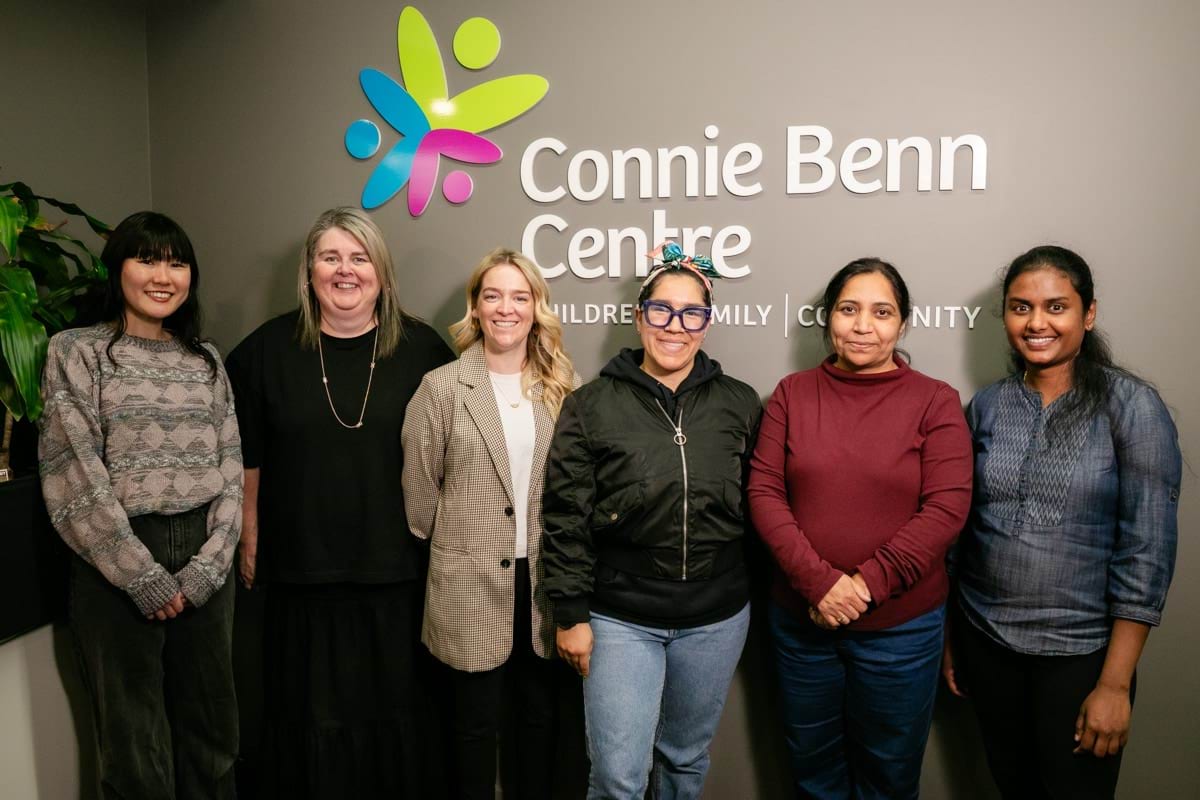
In partnership with Heidelberg Psychological Services
The Connie Benn Early Learning Centre shows how early years services can help children and families facing hard times. Many of the families have social and financial challenges, so the centre focuses on safety, care and wellbeing.
The team has trained in wellbeing and trauma-informed practices. They take part in coaching and debriefing sessions to help them respond to children’s needs with understanding and consistency.
The centre worked with an occupational therapist to create a calming, sensory-rich wellbeing room. Children use it in small groups or one-on-one to learn emotional skills, manage feelings, and meet their sensory needs. The service also works closely with families and local services to give extra support and build a strong network around the children.
Since 2019, the centre has grown from a ‘working towards’ rating to an ‘exceeding’ rating.
Finalists
Latrobe Family Services: Initiatives for Early Years Outcomes – Latrobe City Council
In partnership with Latrobe Community Health
The Latrobe Family Services team runs programs to improve children’s health, wellbeing and learning. The programs also help children who face developmental challenges or disadvantage.
The team focuses on early support, innovation and education. Their work includes:
- introducing the Berry Street Education Model in their early childhood services, which provides a full-time time mentor to guide trauma-informed practice
- providing the Nurse in Preschool Program
- offering in-house allied health services
- running breakfast clubs at all council early childhood services.
The team also runs programs that respects cultures. The annual Yarn and Cuppa event invites Aboriginal families to connect with staff, Elders and each other in a safe space. An Aboriginal Programs Team has helped more Aboriginal and Torres Strait Islander children go to kindergarten.
Road Safety and Bike Riding Program – Nathalia and District Preschool
In partnership with Victoria Police, Early Learning Association Australia, Nathalia Secondary College and Cann’s Bus Lines
The Road Safety and Bike Riding Program at Nathalia and District Preschool is helping children learn about road safety in rural communities. Many children have limited experience riding bikes in town because they live on farms, so the program was created to meet their local needs.
The program is part of the curriculum for three and four-year-olds. It combines physical activity, wellbeing and real-world safety skills. Children learn through play, community activities and regular bike practice. Every child gets a helmet and a bike to help them all participate.
The preschool works with Nathalia Secondary College, police and local services. They work together to provide extra support, such as bike maintenance and travel planning. The preschool now helps other early childhood services set up road safety programs too.
Awarded to two or more early childhood services, schools and/or other organisations that support continuity of early learning through successful transitions.
Winner: The Mooroopna Oral Language Initiative – Mooroopna Primary School
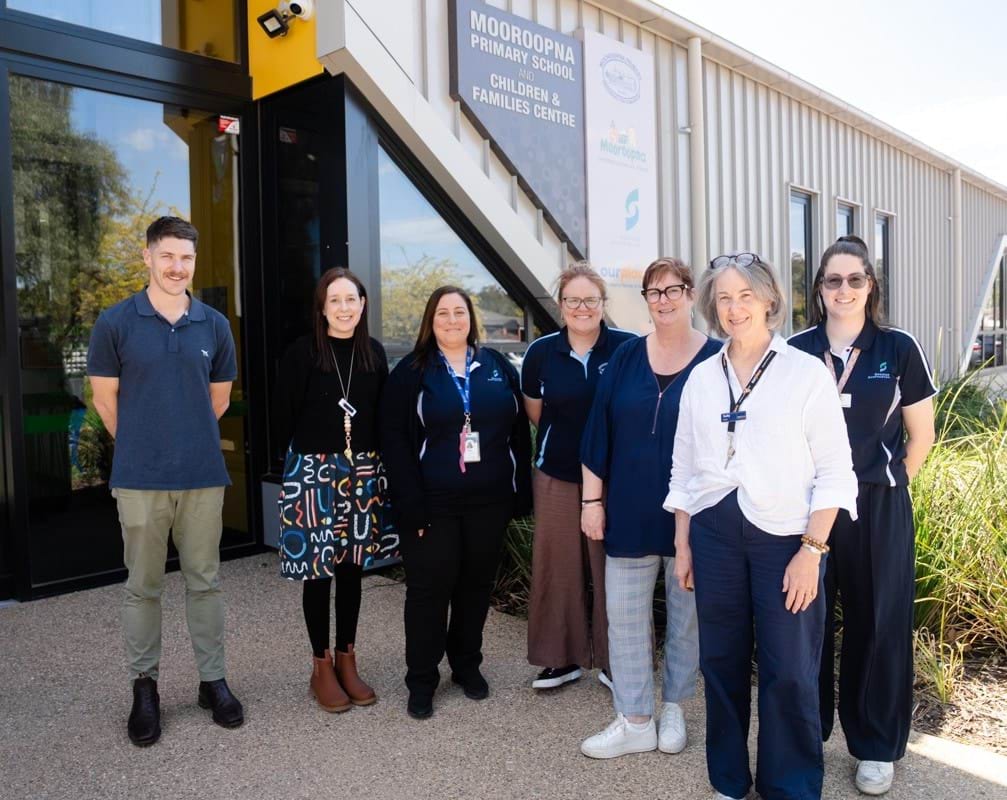
In partnership with Mooroopna Children and Families Centre, Our Place and Greater Shepparton Foundation
The Mooroopna oral language initiative is a partnership between Mooroopna Primary School, the Mooroopna Children and Families Centre, Our Place, and allied health providers.
It was created because many families in Mooroopna face social and financial challenges, and children often need extra support with speech and language. The program helps children get help early and helps them to be ready for school.
Research shows that early checks and support for language skills have long-term benefits. The program gives a 2-year window for children to get extra help before starting school. Language development is built into daily teaching, not treated as a separate support. Educators also get regular ongoing help from the on-site speech pathologist.
The whole community is involved. Families, teachers, and health workers design and run activities together, including weekly story time sessions. By working as a team, the program helps children build strong language skills and succeed at school.
Finalists
The Darebin Early Years to Primary School Transition Network – Darebin City Council
In partnership with the Department of Education – North Eastern Melbourne Area
The Darebin Early Years to Primary School Transition Network is a local partnership that helps children move smoothly from kindergarten to school. It was created to strengthen collaboration and continuity of learning.
Educators, allied health professionals, community representatives, guest speakers and families come together. They meet each term at kindergartens and schools.
The sessions show ways to help children from many different communities move smoothly into school. They include trauma informed support for kids, whole-family help, and teaching that respects different cultures.
Everyone gets to provide input into what will be discussed. Meetings include hands-on learning and the chance to see evidence-based strategies in action.
The network has become a good example of people from different areas working together, learning new things and building strong relationships.
Evaluations show positive results, with children better supported to experience consistent and connected learning as they move from early years into primary school.
Little Steps, Big Futures – South West Healthcare
In partnership with Mitchell Park Kindergarten and Elsa MacLeod Kindergarten
South West Healthcare has partnered with Mitchell Park and Elsa MacLeod kindergartens to introduce a new playgroup model. The playgroups help children move smoothly from home to kindergarten.
Allied health clinicians join the playgroups, which are informal and inclusive. They show families how to use play and language in learning. Families take part in activities that build confidence and skills for learning. Clinicians and educators guide parents through modelling and conversation, rather than formal programs. This helps families build trust and raise concerns early.
The playgroups have increased referrals to family and paediatric services, so children get help when they need it.
The model is now used in more kindergartens across the region. It delivers support in familiar settings and strengthens relationships between families, educators and health services. Outcomes include stronger family engagement, greater educator skills and smoother transitions into kindergarten.
Awarded to an early childhood teacher who demonstrates evidence-based innovation and exemplary practice in early childhood education, and making a significant contribution to the development and delivery of high-quality early childhood education programs that improve learning and development outcomes for children.
Winner: Megan Hancock – Southern Rise Children’s Centre
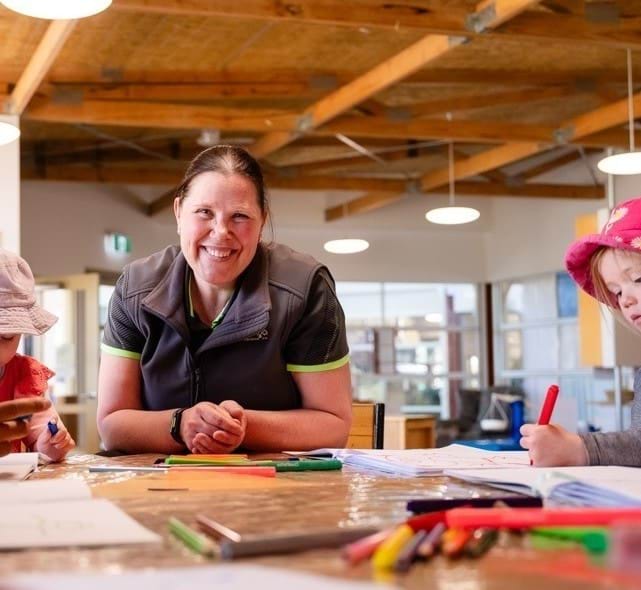
Megan Hancock is the lead teacher at Southern Rise Children’s Centre. She creates inclusive learning spaces that celebrate culture and identity.
An increase in enrolments of Aboriginal and Torres Strait Islander children inspired Megan to join the NOWPlay Project. This program introduces play-based learning that builds oral language and literacy through culturally responsive experiences. She works closely with families, Elders and the Koorie Engagement Support Officer to deliver this program.
Megan believes all children can learn and makes sure programs celebrate who they are. Together they share stories and songs in local Aboriginal languages, explore traditional art and care for a bush tucker garden.
She leads the Koorie Champions Network Group and supports educators in Wodonga to build cultural knowledge and confidence.
Megan’s leadership has built strong relationships with Aboriginal families and improved children’s language, social and thinking skills. Her work is helping create early learning environments where every child feels valued and proud of who they are.
Finalists
Larissa Hayes – Monash Vale Early Learning Centre
Larissa Hayes is a teacher at Monash Vale Early Learning Centre. She helps build strong relationships with the Boonwurrung community and brings First Nations’ perspectives into everyday learning.
Larissa worked with Jaeden Williams from Biik Bundjil to develop the 'Yulendj' curriculum. This resource is practical, culturally relevant and supports staff, children and families. She also led a storytelling project with Kirrip Preschool children and Biik Bundjil. This resulted in publishing a children’s book celebrating culture and children’s voices.
Larissa shares her skills with colleagues through mentoring and professional learning. She leads discussions about culture, inclusion and respectful storytelling.
Her work has strengthened cultural understanding, built community connections and created lasting positive change. Larissa’s approach turns learning into action that benefits the whole service and helps children feel proud of their culture.
Hannah Stephen – The Honeypot Early Learning Centre
Hannah Stephen is an early childhood teacher at The Honeypot Early Learning Centre.
She runs Beach Kinder, which takes the kindergarten experience to the beach. The program encourages physical activity, exploration and connection to nature. Hannah creates flexible and adaptable learning spaces that help children who find traditional classrooms challenging. Families are involved from the start, sharing goals and joining in learning.
Hannah works closely with Parks Victoria through the Parks Connect initiative. This helps Beach Kinder follow rules for the marine sanctuary. Children learn to respect the beach and leave plants, shells and wildlife in their natural place.
Beach Kinder helps children manage their emotions, make friends and join in learning. The natural setting with sand, water and open space helps children slow down, feel calm and notice their feelings.
Hannah’s leadership and care shows the difference that supportive, inclusive environments make. Her work helps children feel valued, grow in confidence and reach their potential.
Awarded to an early childhood service or approved service provider that has led their educators and teachers to significantly improve the quality of their learning and teaching practices, with a focus on intentional teaching practices to achieve improved outcomes for Victorian children and their families.
Winner: Home Road Kindergarten
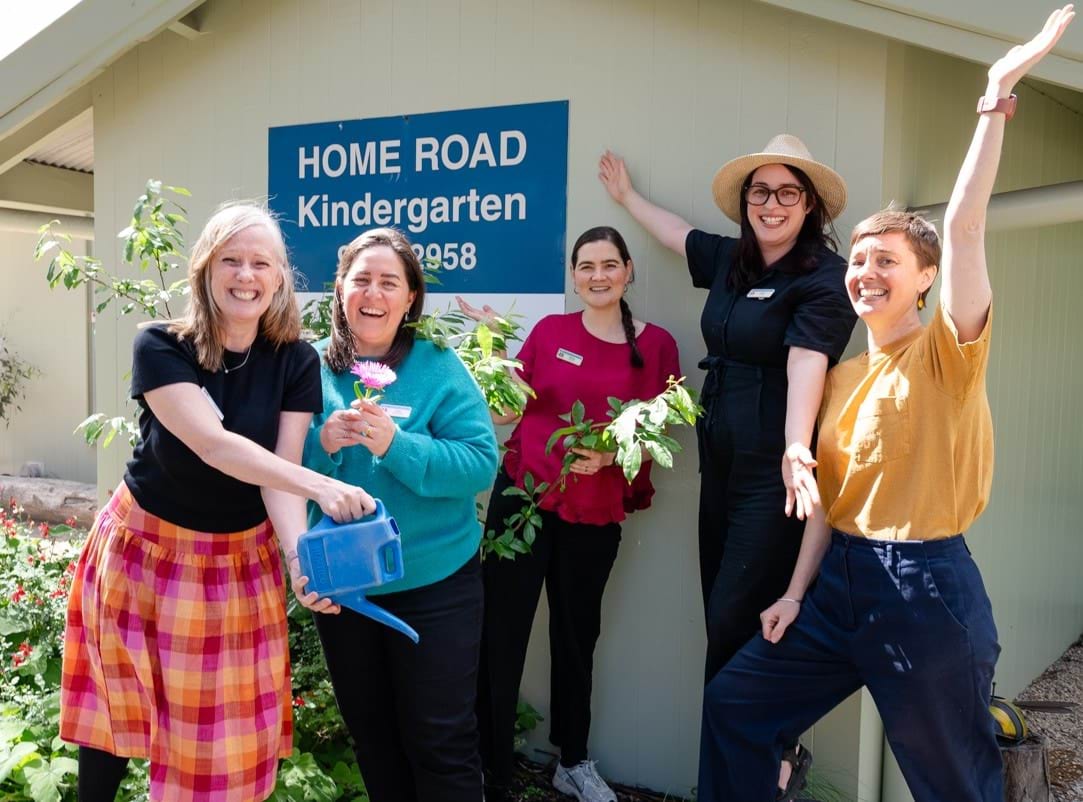
Home Road Kindergarten created an educational model that focuses on children’s relationships with themselves, others and the world. The model was created using regular reflection, targeted staff training and shared leadership.
The service uses the team’s strengths to create learning that includes everyone. Staff take part in training that helps them support children’s choices, learn about the history and experiences of First Nations people, and work with families to encourage positive behaviour.
The service runs ‘Kinder on Country’, which brings First Nations perspectives into all areas of their teaching. They also run outdoor programs in the bush and at the beach for the children. An educational leader is trained as a ‘Circle of Security’ facilitator. They help staff and families understand children’s feelings and needs, so children feel safe, loved and confident.
By focusing on relationships and reflection, Home Road Kindergarten creates welcoming learning environments where all children can thrive.
Finalists
Hema Srekrishnan – Elonera Preschool Association Inc
Hema Srekrishnan is the educational leader at Elonera Preschool. She supports the team to think carefully about their work using current ideas and research. This reflection helps them plan teaching that is thoughtful, creative, and focused on children.
She introduced a shared leadership approach where educators take on leadership roles that suit their skills and interests. They are provided with time away from teaching to research and implement their work.
Hema organised training to help educators identify speech and language concerns and make referrals for children. This has helped families feel supported accessing early intervention pathways. She also leads the ‘Kinder Library’ program to encourage shared reading. Eighty-five per cent of families reported improvements in their children’s literacy since joining the program.
Hema uses reflection, teamwork, and research-based practice to guide engaging and supportive learning experiences for children.
Yarra Children's Services – Yarra City Council
Yarra Children’s Services has created a new way of leading its early years services, called the precinct model. This approach helps keep teaching consistent and high quality across different sites.
There are 4 precincts in Richmond, Collingwood, Fitzroy, and North Yarra. Each one brings together nearby services, many close to public housing. This helps families who need extra support to easily access them. A small leadership team works in each precinct to strengthen teaching practices, share ideas, and help staff develop leadership skills.
The model is based on mentoring that builds strong relationships. Senior leaders give regular help to precinct leaders, with support that matches each person and team’s needs. Staff say this has made their teaching goals clearer, given them more confidence with the curriculum, and improved teamwork.
The model has led to improved assessment and rating outcomes, lower staff turnover, more family involvement, and has helped prepare the next group of leaders.
Awarded to one or more early childhood service/s that are demonstrating holistic service provision that engages Aboriginal children and families, building Aboriginal perspectives and amplifying the voices and experiences of Koorie families and local community members through partnerships that enable self-determination.
Winner: Harrietville Bush Kinder
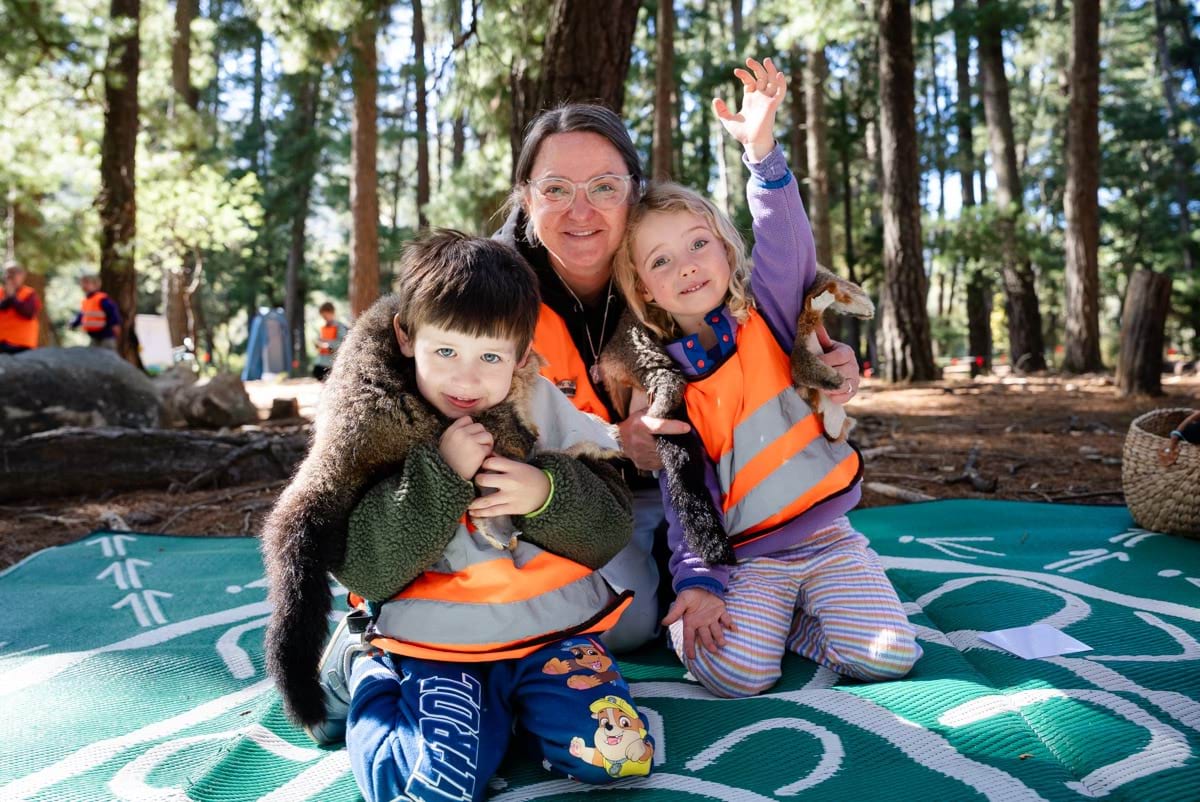
Harrietville Bush Kinder is a safe and welcoming place where all children can learn and grow. The kindergarten works closely with Dhudhuroa Elders to share Aboriginal culture and language. This helps children build respect for First Nations people and their history.
Children join in Dhudhuroa Language Days, where they learn new words and ideas through play, songs, and stories. Teachers use the ‘8 Aboriginal Ways of Learning’ framework to guide their teaching. They include cultural tools like possum skin journals and First Nations storybooks, making learning fun, meaningful, and connected to culture.
The service has strong partnerships with Elders, cultural organisations, and local Aboriginal wellbeing practitioners. These connections help Koorie children feel proud of their identity and support their wellbeing and learning.
Each year, staff, Elders, children, and community partners all help update the service’s Reconciliation Action Plan. This shows how everyone can work together to keep language and culture alive for all learners.
Finalist
Little Assets Melbourne City Early Learning Centre
Little Assets Melbourne City Early Learning Centre is working to bring Aboriginal and Torres Strait Islander culture into everyday learning. The service has partnered with groups such as the Wurundjeri Woi-wurrung Cultural Heritage Aboriginal Corporation, Djirri Djirri Dance Group, and Koorie Curriculum. These partnerships help the service to support children to learn about Aboriginal culture in authentic and respectful ways.
Staff attend training with Elders and advisors and follow a Reconciliation Action Plan. They also receive mentoring and cultural advice from wayipungitj ((formally Koori Pre-School-Assistant). This gives them the confidence to include Aboriginal and Torres Strait Islander perspectives in daily teaching. Children celebrate Koorie identity through cooking bush tucker, learning songs and dances, learning language, and listening to stories. The service also works with Aboriginal support agencies to ensure families feel included and supported.
The team take part in leadership forums and Early Years Networks where leaders share ways to support inclusion and culture.
Awarded to an early childhood educator who demonstrates evidence-based innovation and exemplary practice in early childhood education, and making a significant contribution to the development and delivery of high-quality early childhood education programs that improve learning and development outcomes for children.
Winner: Sandra Houlahan – Shine Bright Elmore Kindergarten
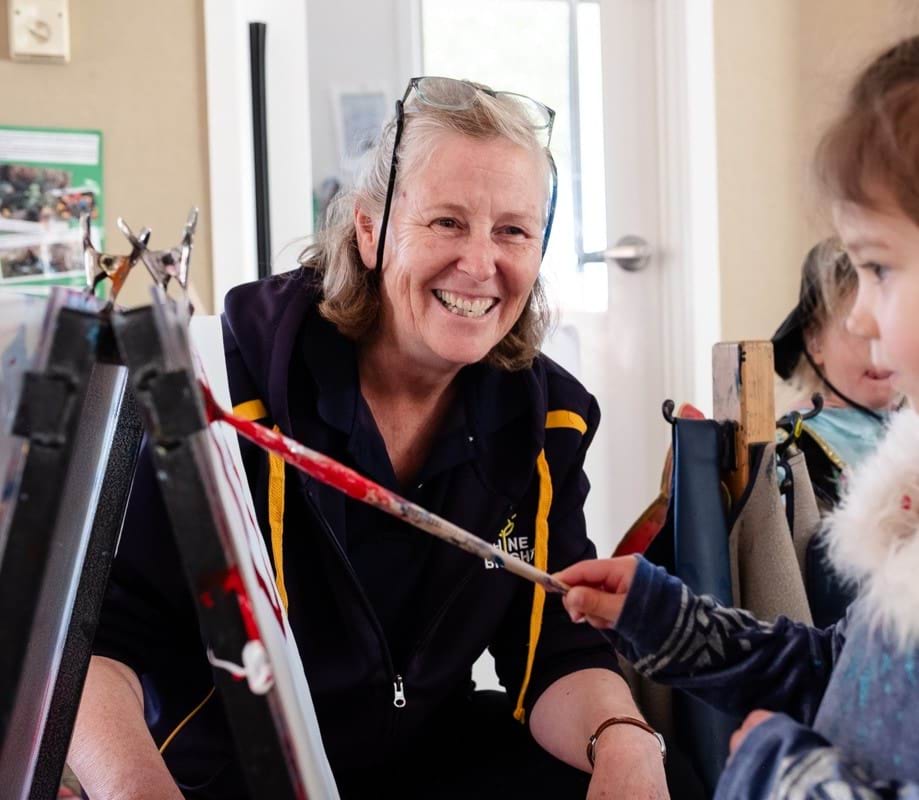
Sandra Houlahan is the lead educator at Shine Bright Elmore Kindergarten. She is well known in the small town of Elmore for building strong ties with the local community.
Sandra turns local places and resources into fun and meaningful learning experiences. She started a nature-based program called River Kinder, where children explore the Campaspe River. This helps them become curious, resilient, and respectful of the environment. She also builds community connections by taking children to local landmarks, schools, and businesses.
Sandra works closely with nearby schools to help children move smoothly from kindergarten to school. She also worked with health professionals to create a literacy program that gives families simple ways to support their child’s language and reading skills at home.
With over 30 years of experience in early childhood education, Sandra leads with care and teamwork. She continues to reflect on her work to run programs that support both children and the wider community.
Finalists
Jinali Amaya Sooriyaarachchi – Charming Cherubs Early Learning Centre
Jinali Amaya Sooriyaarachchi understands that families are a child’s first teachers. She works closely with parents and carers to create learning experiences that respect and include different cultures.
She celebrates children’s home languages and includes cultural traditions in group activities. Through projects like “Culture in Our Hands,” Amaya helps children learn about their background using photos, cooking, and storytelling. This helps them feel proud of who they are and where they come from. She plans activities based on each child’s interests and strengths.
Amaya also mentors other educators and student teachers. She leads group discussions and shows how to implement ideas from training into teaching and how to reflect on teaching practice. She keeps learning about important topics such as trauma-informed support, cultural inclusion, and the different ways children learn.
Akiko Yamazaki-Edwards – Dobson Kindergarten
Akiko Yamazaki-Edwards is an experienced educator at Dobson Kindergarten. She is inspired by the Japanese idea of Wabi-Sabi, which is about keeping things simple, taking time to reflect, and finding beauty in things that aren’t perfect.
She uses this idea in her teaching by creating calm and considered spaces for children to learn. She uses natural and recycled materials to encourage curiosity, independence, and exploration. Akiko reflects on her work using the Victorian Early Years Learning and Development Framework, builds strong relationships with families, and creates respectful, caring connections with children so they feel like they belong.
Akiko speaks more than one language and values fairness and diversity. She shares what she knows with other teachers, families, and children, and shows how to work together with respect. Her way of teaching helps children develop their skills and feel safe, welcome, and included.
The Minister’s Award is a special commendation that has been selected from the pool of finalists across all nine categories and selected by the Minister of Early Childhood.
Winner: Supporting Expecting and Parenting Teens Program – Brave Foundation
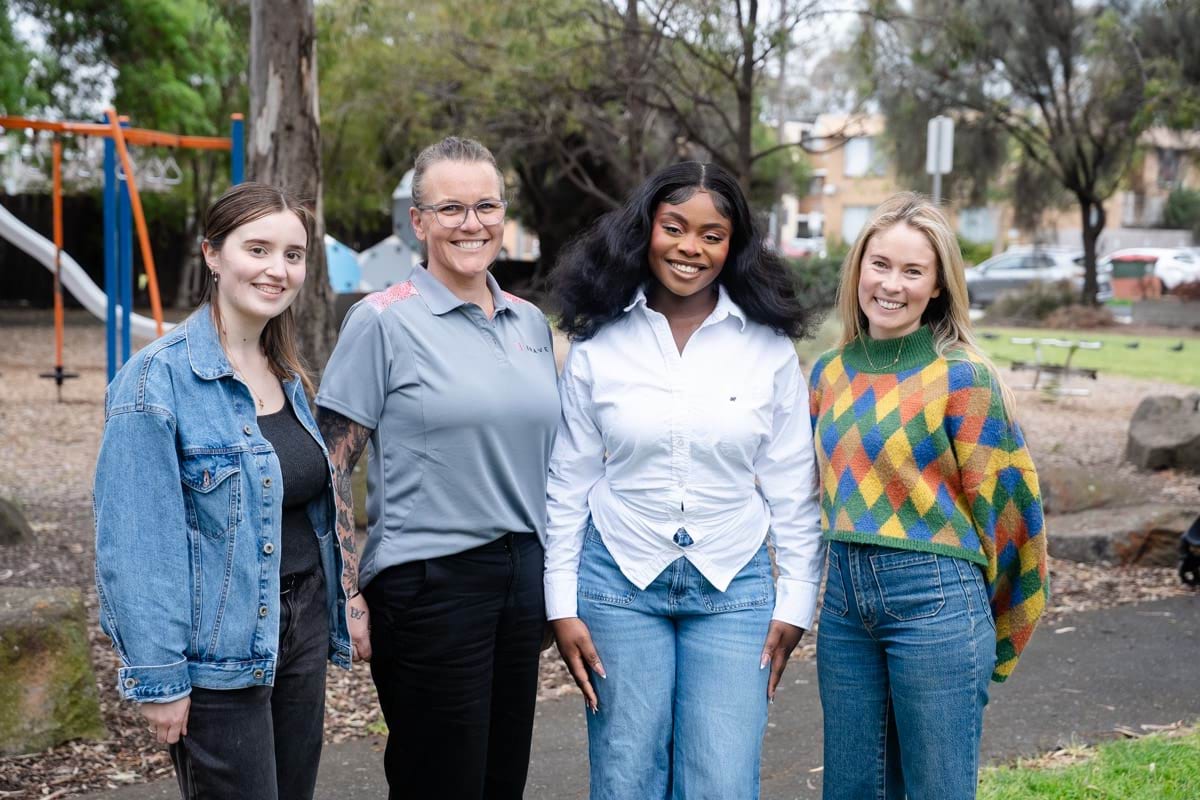
Brave Foundation runs the Supporting Expecting and Parenting Teens program for young parents aged 25 years and under who had their first child as teenagers. The program is an evidence-based mentor program. It was created and is led by people who have experienced young parenthood. It gives practical support to help young parents build lives that are healthy and connected.
Mentors work in three locations across Victoria. They use a trauma-informed and strengths-based approach to help young parents achieve their goals in parenting, education, health, housing, money and community life.
An evaluation by the University of Tasmania shows the program helps parents and families. It helps parents become more confident, use health services, engage in early learning, and develop life skills, which benefits children.
Updated